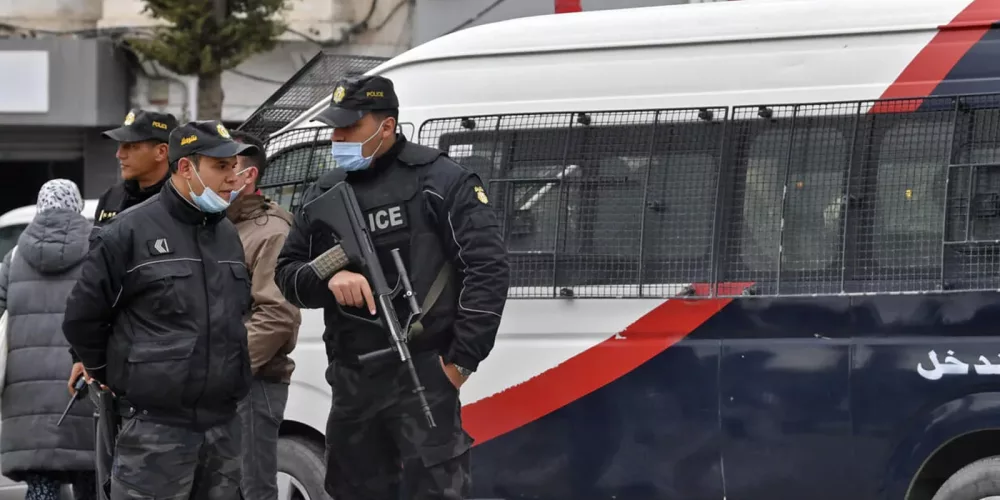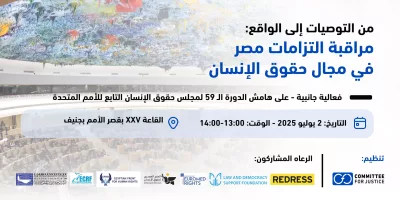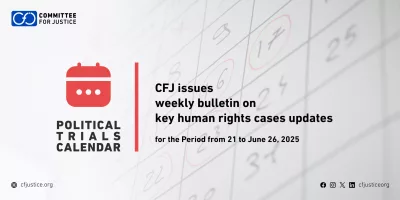The Committee for Justice (CFJ) has condemned the recent arrest campaign targeting members of the Ennahda Movement and other political figures from various factions in Tunisia, calling it an unprecedented and dangerous escalation in the ongoing wave of repression sweeping the country.
These arrests are linked to allegations of conspiracy against state security in a new case recently opened by Tunisian authorities, raising concerns about the deterioration of political conditions and human rights in the country ahead of the upcoming presidential elections.
CFJ believes these developments come at a time when public freedoms are increasingly under pressure, and political space is being restricted in Tunisia, with growing fears that the ruling authorities are using judicial and security agencies to settle political scores.
According to the detainees’ lawyer, the National Guard’s anti-terrorism unit investigated five individuals, including a member of Ennahda’s executive office, on charges related to conspiring against state security. The lawyer also indicated that the campaign was not limited to these individuals alone, as it involved the arrest of at least 80 people from various parts of the country, underscoring a growing trend of expanding the scope of repression.
CFJ considers these arrests to be linked to the escalating political tensions ahead of the presidential elections, where analyses suggest that the ruling authority, led by outgoing President Kais Saied, may be seeking to tighten its grip on political opposition and prevent any potential alliances that could pose a serious threat to his chances in the elections. One of the major concerns in this context is the possibility of cooperation between the Ennahda Movement and one of the presidential candidates against President Saied, which could put the ruling authority on the defensive and increase its desire to intensify security and repressive measures to prevent any coordinated opposition efforts.
The committee notes that these developments are part of a broader campaign by the Tunisian authorities specifically targeting the Ennahda Movement, as dozens of the movement’s members have been arrested recently, according to statements from the movement’s spokesperson. He confirmed that these actions only exacerbate the country’s situation and deepen the divide between the government and the public. He also pointed out that many of the detainees are retirees and elderly individuals over the age of sixty, emphasizing that these arrests lack any legal or ethical justification and aim to drain the opposition’s ability to organize and engage in peaceful political activities.
CFJ also believes that these arrests are not merely temporary security measures but reflect a broader strategy pursued by the Tunisian authorities to impose their control over the political scene and prevent any serious challenges to their power. The committee asserts that using terrorism and state security conspiracy charges as a pretext to detain political opponents and human rights defenders is a serious breach of the law and a clear violation of the fundamental rights and freedoms guaranteed by the Tunisian constitution and international law.
In this context, CFJ highlights that these arrests are part of a systematic repression that has been ongoing in Tunisia for some time, where the suppression of civil space, arbitrary arrests, and the demonization of opponents have become the dominant approach in dealing with anyone who opposes the authorities. This repressive approach starkly contrasts with the Tunisian people’s aspirations for freedom and democracy, which were among the most important achievements of the Tunisian revolution.
CFJ denounces this repressive campaign being carried out by the Tunisian authorities and calls for an immediate halt to all arbitrary measures and arrests against opponents and human rights defenders. The committee also stresses the need for the immediate release of all political and opinion detainees, including those arrested in the recent campaign.
Furthermore, CFJ urges the Tunisian authorities to reopen civil and political space in the country, provide a safe environment for human rights defenders to operate, and ensure their fundamental freedoms. The continuation of this repressive campaign will only stifle the nascent freedoms in Tunisia and reinforce a climate of fear and repression that threatens the country’s democratic future. This dangerous deterioration calls for serious action from the international community and democratic forces within Tunisia to halt this decline.
In conclusion, CFJ warns that Tunisia, once a beacon of freedoms in the region after the 2011 revolution, is now facing a real threat to its democratic future. The continuation of these repressive policies will only deepen the political and social crisis, requiring all active forces in Tunisia to unite against this authoritarian trend and push for real political reforms to restore the country to its rightful democratic path.






